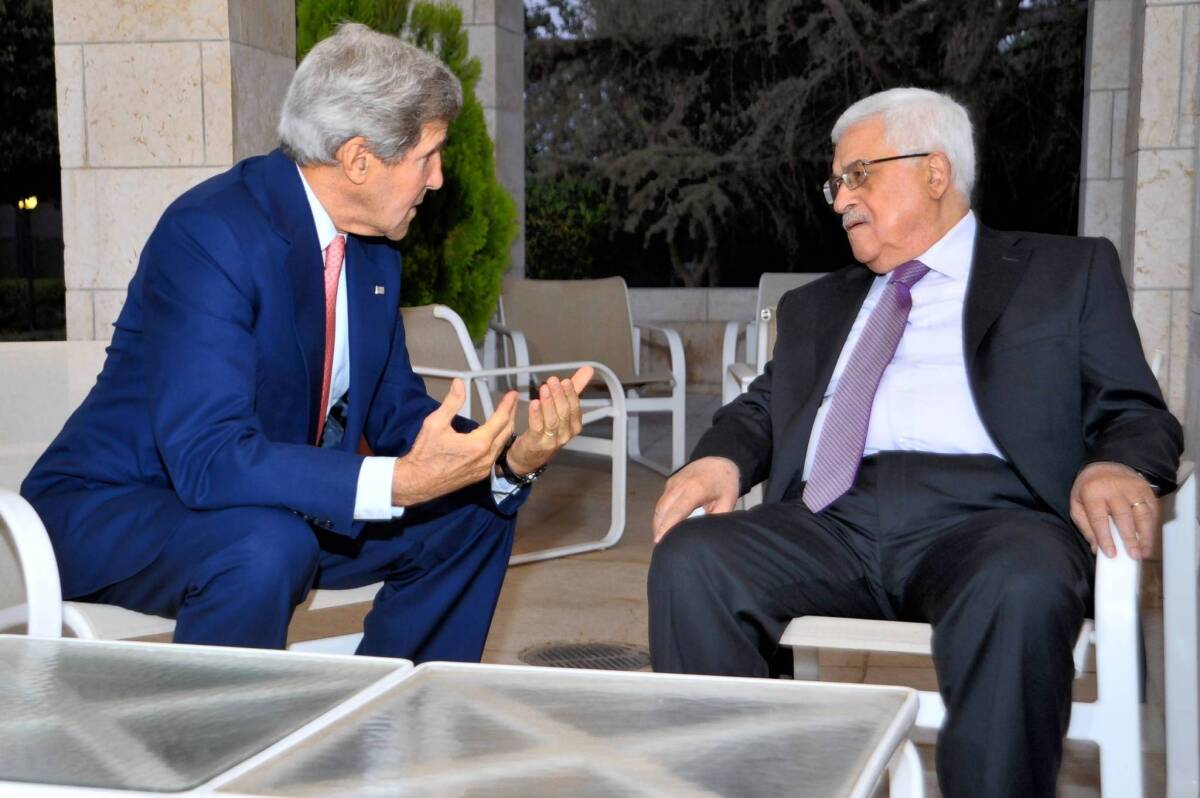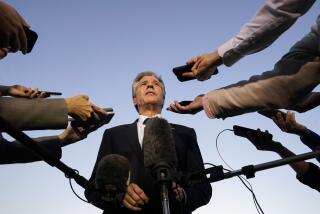Arab League backs Israeli-Palestinian talks; EU sanction may be snag

- Share via
AMMAN, Jordan — The Obama administration’s efforts to restart Israeli-Palestinian peace talks won the blessing of an influential Arab group Wednesday, but faced a dangerous new complication in the controversy stirred by a European Union sanction of the Jewish settlement movement.
After a meeting Wednesday with Secretary of State John F. Kerry in Amman, a committee of the Arab League said the U.S. effort was “a good ground and a suitable environment for restarting the negotiations” between the Israeli and Palestinian governments. The statement by the 22-member group may give Palestinian Authority President Mahmoud Abbas more political support for rejoining talks, a move likely to be unpopular with some of his constituents.
But whether Israel will now be prepared to rejoin talks was unclear because of a tempest stirred by the EU’s decision, disclosed Tuesday, to halt any assistance, including grants, financing or scholarships, to companies or institutions based in Jewish settlements in the West Bank.
The announcement has brought angry denunciations from Israeli officials, and predictions from some prominent Israelis that the talks cannot resume while the EU guidelines stand.
Israeli Justice Minister Tzipi Livni met with EU officials and urged them to drop the rule to bolster the chances for resumption of peace talks. Avigdor Lieberman, the conservative former foreign minister, said the guideline, if implemented, would “blow the chances for any peace talks, which the Europeans want so badly,” according to Israel’s Ynet news organization.
The EU’s move was largely symbolic, but it gave rise to Israeli fears of growing international isolation over what many foreign governments see as the gradual illegal takeover of Palestinian land in the West Bank.
EU officials sought Wednesday to deflect criticism of the sanction, saying it was not new and not a substantial change in their policy on settlements, which they have long condemned. But they did not promise to immediately undo it.
The eruption came during the secretary of State’s sixth visit in four months to the region in an effort to restart the peace talks, which have been dormant for three years. Kerry believes the two sides are close to a resumption of direct negotiations.
Kerry met Abbas for five hours in a session that lasted until 1 a.m. Wednesday. They met again in the afternoon. Kerry also spoke to Israeli Prime Minister Benjamin Netanyahu by telephone.
On Thursday, Abbas is to meet with the executive committee of the Palestine Liberation Organization, the ruling party in the West Bank, in a session that could signal whether the Palestinian side is prepared to set aside its reservations about negotiations.
Abbas has been seeking a complete halt to settlement activity and the release of more than 100 longtime Palestinian prisoners before he would return to the table. The Israelis appear unlikely to meet either demand, though they reportedly have slowed construction in the West Bank.
On Wednesday, an Israeli military committee moved ahead with plans for 732 units in the settlement of Modiin Illit, Israeli news reports said.
In an appearance with Jordanian Foreign Minister Nasser Judeh on Wednesday afternoon, Kerry was optimistic about the prospects for talks. He said the two sides have been able to narrow the gaps between them “very significantly; and so we continue to get closer, and I continue to remain hopeful that the sides will soon be able to come to sit at the same table.”
He added that “there are still some elements and some language that needs to be agreed upon” before talks can resume.
Kerry has declined to detail most elements of the discussion, as he has for months, for fear of stirring controversy that could block the talks. But he did say that the plan involves both an effort to revive the Palestinian economy and a security plan that would help guarantee safety not only for Israel, but also for the Palestinians and for other countries in the region.
Kerry said the plan, developed with the help of major consulting firms and business leaders, aims to double the Palestinians’ gross domestic product and reduce their unemployment rate to 8% from 21%.
Times staff writer Edmund Sanders in Jerusalem contributed to this report.
More to Read
Sign up for Essential California
The most important California stories and recommendations in your inbox every morning.
You may occasionally receive promotional content from the Los Angeles Times.











